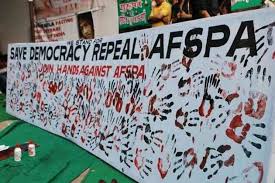Ishfaq-ul-Hassan
SRINAGAR—An eerie silence has enveloped Jammu and Kashmir after centre reduced Armed Forces Special Powers Act (AFSPA) in three northeastern states.
Union Home Minister Amit Shah on Thursday announced that the central government has decided to reduce the disturbed areas under Armed Forces (Special Power) Act, 1958 (AFSPA) in Nagaland, Assam, and Manipur.
Shah announced the much-expected decision in three separate tweets when most of the political parties and NGOs have been demanding to repeal the AFSPA. The demand intensified after the security forces killed 14 people and injured 30 others in Mon district of Nagaland on December 4 and 5 last year.
“In a significant step, GoI under the decisive leadership of PM Narendra Modi Ji has decided to reduce disturbed areas under Armed Forces Special Powers Act (AFSPA) in the states of Nagaland, Assam, and Manipur after decades,” Shah tweeted.
“Reduction in areas under AFSPA is a result of the improved security situation and fast-tracked development due to the consistent efforts and several agreements to end insurgency and bring lasting peace in North East by PM Narendra Modi government,” he said.
Soon after the decision, political parties, which have been vocal about AFSPA revocation in Jammu and Kashmir, withdrew into a shell. Two chief ministers, Omar Abdullah and Mehbooba Mufti, maintained radio silence. No tweet and no statement either. This is even though the PDP and BJP had decided to amend Disturbed Areas Act when they were in coalition.
“While both parties have historically held a different view on the Armed Forces Special Powers Act (AFSPA) and the need for it in the State at present, as part of the agenda for the governance of this alliance, the coalition government will examine the need for de-notifying ‘disturbed areas.’ This, as a consequence, would enable the Union Government to take a final view on the continuation of AFSPA in these areas,” reads the Agenda of Alliance that was signed by PDP and BJP when they joined hands to form the government.
This time, PDP leaders have decided to keep their mouths shut, though Mehbooba has been vocal in criticizing BJP-led government on all issues. Even Mehbooba lashed out at centre on `The Kashmir Files’ issue.
Under AFSPA, the armed forces have sweeping powers to operate in the state with impunity. An official of the armed forces can shoot anybody if he thinks that he is acting against law. Under AFSPA, the forces can also search or even destroy property if they believe that it is used as hideouts for the ultras. In normal circumstances, it is the competent magistrate who has to give orders to open fire or search the property.
There have been instances when the previous Jammu and Kashmir governments came close to reducing AFSPA in the erstwhile state. On both occasions, Congress was ruling at centre. Congress has a history of betraying J&K. On one occasion, AK Antony was the defence minister and P Chidambaram was the home minister.
In the 2019 general election, Congress included revocation of the Armed Forces Special Powers Act (AFSPA) and holding unconditional dialogue in its manifesto. However, the party came under heavy attack by BJP which used the issue to its advantage to secure a second term.
Abrogation of Article 370 and downgrading J&K into union territory has had a cascading effect on Kashmir’s polity. Separatists have shut their shops and human rights activists have withdrawn into a shell. This summarizes the silence of political parties in Kashmir over AFSPA.





